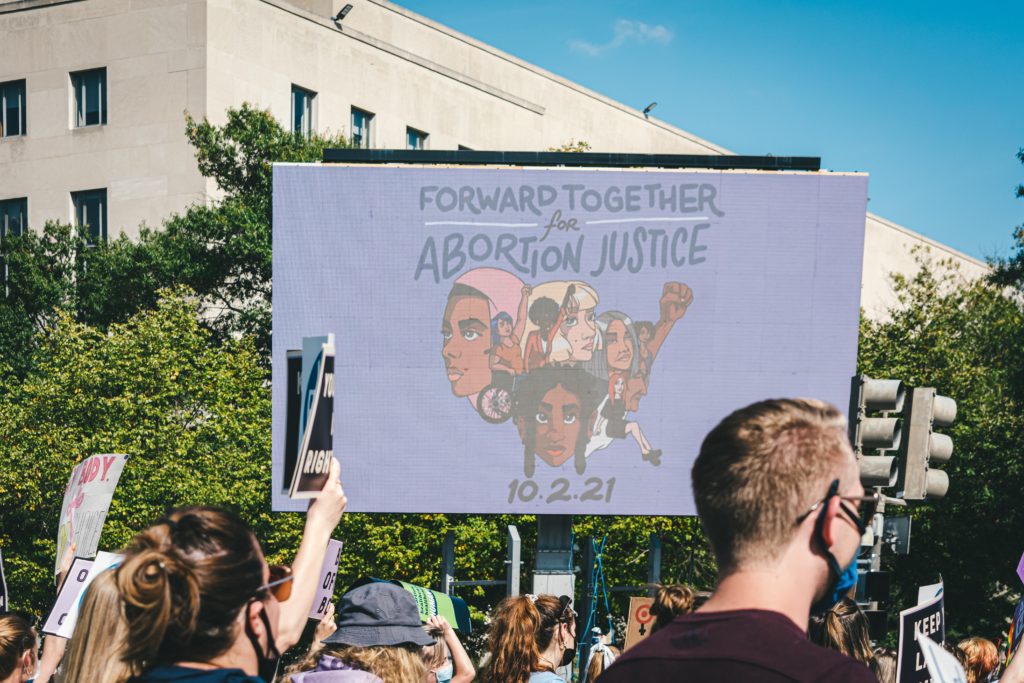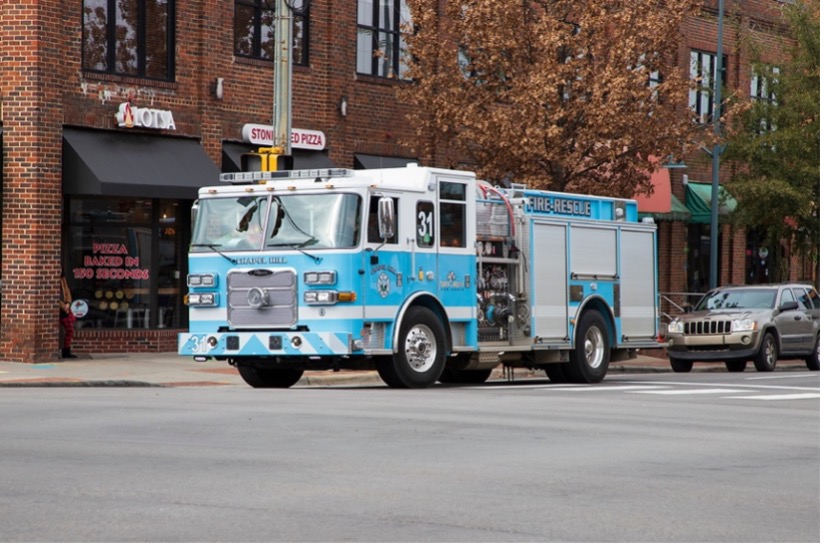We hosted an event on November 17th, 2021, that addressed the following theme: “Reproductive Justice Teach-in: The New Texas Law, National Implications and Actions to Take”. Our panelists Alise Powell, Ashley Navarro, Lynne Walter, and Maya Hart. The session was moderated by Kennedy Bridges and Sarah Verbiest. This event was co-sponsored by the School of Social Work Office of Diversity, Equity, and Inclusion and the Jordan Institute for Families. Click here to view the session.
The passage of Texas’ restrictive abortion law ignited staff at the Jordan Institute, the School of Social Work and across North Carolina to connect, educate, and resist regressive forces in our communities. This reaction was out of deep concern for the devastating impact this would have for people in Texas and potentially in North Carolina.
Through this panel discussion, we explored the implications of the recently implemented law, S.B. 8, in Texas that bans abortion after six weeks of gestation. We invited four practitioners specializing in legal and policy analysis, health care, clinical social work, advocacy, and community organizing to share their perspectives on efforts to dismantle Roe v. Wade. Our conversation drew connections between these recent events and the framework and efforts of the reproductive justice movement. The discussion ended with collective brainstorming around ways we can take action to advance sexual and reproductive well-being for all.
Every panelist spoke about the disproportionate burden these restrictive laws place on people in poverty, Black, Indigenous, and other People of Color, immigrants, queer people, and anyone marginalized in other ways. The intergenerational and cumulative effects of structural and systemic racism have and will continue to restrict reproductive liberation.
Maya Hart, (North Carolina Coordinator at SisterSong Women of Color Reproductive Justice Collective) shared the history of the Reproductive Justice framework that was developed by 12 women of color who didn’t see themselves and their issues represented in the mainstream conversations about reproductive health and rights. Three years later, SisterSong was created by 16 organizations that centered the lived experiences of Black, Latinx, Indigenous, and Asian/Pacific Islander folks.
The four principles of Reproductive Justice are 1) Decide if, when, and under what conditions to have a child; 2) Decide between their options for preventing or ending pregnancy; 3) Parent children in safe environments free from violence; and 4) Maintain bodily autonomy free from all forms of reproductive oppression. Reproductive Justice is the confluence of reproductive health issues (e.g., care, services, outcomes) and reproductive rights issues (e.g., laws, court cases). The framework and movement go beyond choice to center access because even when abortion is legal there are so many other barriers in place that restrict access. We must consider how factors like race and class can radically impact one’s ability to fully exercise one’s rights.
Alise Powell (Federal Policy Analyst at the National Birth Equity Collaborative) provided the political and legal context for S.B. 8, the Texas Heartbeat Act, and other restrictive abortion legislation. Most notably, she explained how the Dobbs v. Jackson Women’s Health Organization Supreme Court case which challenges Mississippi’s 15-week abortion ban law could impact abortion access across the nation through setting new legal precedent.
She shared information about the limiting reproductive health care access that demonstrates this issue isn’t isolated to Texas or the “Deep South.” Nineteen states enacted more than 100 abortion restriction laws in 2021 alone. Eleven states have “trigger” laws that would go into effect to ban abortion pending the Dobbs case decision. The evidence Powell shared made it clear that these two states laws and their corresponding cases are just the tip of the iceberg for concerns around reproductive justice because many other states are poised to revoke abortion access if (or when) Roe v. Wade is overturned.
Ashley Navarro, MD, MPH (Complex Family Planning Fellow at UNC-Chapel Hill) shared her perspective as a clinician on the impact of restrictive abortion legislation on the public’s health, pregnant peoples’ bodies, and for abortion providers. She shared that 50% of pregnancies are unplanned in the United States. Socioeconomically marginalized groups and those who had another pregnancy within the last 2 years are most impacted. She also included information on the prevalence (1 in 4 people who can become pregnant) and safety of abortion. She gave us highlights on North Carolina’s abortion policy including a 72-hour waiting period, “counseling” that is not evidence-based, required ultrasounds, parental consent, laws targeting providers and facilities, and limitations on insurance coverage.
Navarro made the salient and sobering point that regardless of the law, abortion will always happen. Although, without the legal protections, the abortion is more likely to be unsafe, performed by people who are untrained, and can lead to severe injury or death.
Lynne Walter, MSW (Advocacy and Organizing Manager, at NARAL Pro-Choice North Carolina)gave us many ideas on how we can engage in advocacy and action in North Carolina and beyond. She told us about North Carolina’s state budget, highlighting two major issues. First,there’s still no Medicaid Expansion. NC is 1 of only 12 states that refuses to expand insurance coverage. This has severe implications amid the COVID-19 pandemic and for equitable reproductive health access. Second, the legislature plans to give $16 million to fund anti-abortion fake clinics that don’t provide medical care. In NC, there are over 100 of these “crisis pregnancy centers” while there’s only 15 abortion care facilities. It’s even more troubling to consider how this money could be used to benefit reproductive health and wellbeing.
Actions to Take:
Hart stressed the importance of language and the harm in defaulting to “women” when we’re really talking about all people with uteruses. It is essential that this work is more intentionally queer- and trans-inclusive. Walter also helped us to identify some levers of change in North Carolina including how to find your legislators, calling or writing to them to share feedback on the budget, and encouraging them to uphold Cooper’s vetoed House Bill 453.
If you’re able, we encourage you to donate to your local abortion fund. If you’re in the Carolinas, the Carolina Abortion Fund supports people emotionally and financially to access abortions.
Abortion clinics and the people seeking services are often the targets of harassment from anti-choice protesters. This experience can be especially traumatic during an already sensitive time. So, you can volunteer to transport or escort people safely to and from their abortion provider.
Spread the word! Share what you’ve learned with others in your community. It’s important to be aware of how our laws are changing. This can help increase our people power to resist reproductive injustice
Another important topic for future discussions is to consider how we can atone for social workers’ role in our state’s history of eugenics and other reproductive injustices. Are there ways we can work with the communities most impacted to disrupt the legacy of eugenics?
Also, you can expect more action and opportunities to engage to advance reproductive justice from the School of Social Work in the coming months. Follow us to stay tuned!

